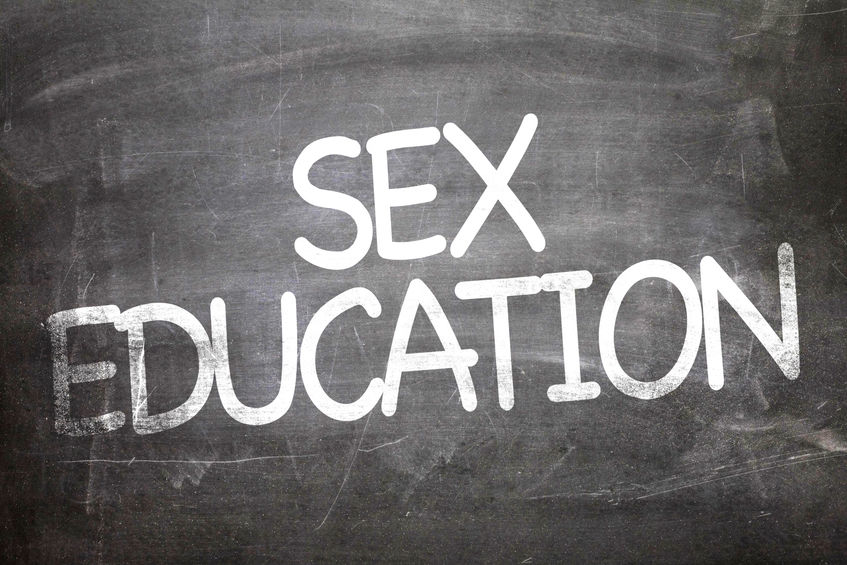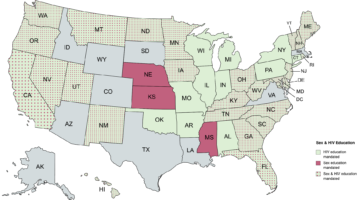The State of Sex Education in the United States in 2021 (Infographic)
February 4, 2021 by Justin Lehmiller
Teens across the United States have wildly inconsistent experiences with sex education. Currently, 20 states do not require sex ed, and even in those states that mandate it, the information teachers provide does not necessarily have to be useful or correct. In fact, in thirteen of the states that require sex education, the materials provided do not have to be medically accurate!
American sex education is not sufficient, which is a big part of the reason why the U.S. continues to have one of the highest rates of teen pregnancies and STIs in the industrialized world. Check out the infographic below for a closer look at how variable sex education is throughout the nation today.
Sex education is vital to adolescent sexual health, but content matters. For example, research has found that the U.S. states with the most abstinence-only programs actually have the highest rates of teen pregnancy [1]. By contrast, comprehensive sex education is not only linked to lower rates of teen pregnancy [2], but also to lower rates of STI-risk behavior [3]. The evidence is overwhelming that simply teaching students to avoid sex until marriage is linked to worse outcomes than teaching them practical sexual skills and information.
However, comprehensive sex education offers a number of benefits beyond improved sexual health. For example, these programs are also linked to greater feelings of sexual empowerment by shifting traditional views of men and women [4]. This, in turn, can facilitate healthier sexual relationships.
Without school-based sex education, adolescents are likely to turn to unreliable and inaccurate sources of information about sex, including peers and porn. Students want useful school-based sex ed, too. In fact, some research has found that students see school as their single most-important source of sexual health information [5].
Parents generally want schools to provide this information as well, and this is one area where most Americans across the political spectrum agree: research finds that Republicans and Democrats alike support comprehensive sex education [6].
In order for change to occur, we need to work with the people who have the power to change it. If you want to help facilitate change, start by getting involved at the local level, because this is where most decisions about sex education content are actually made. Take interest in what your kids are learning (or failing to learn) about sex in school. Identify deficiencies in the program and follow-up with your local school board.

For other infographics about sex, click here.
Want to learn more about Sex and Psychology? Click here for more from the blog or here to listen to the podcast. Follow Sex and Psychology on Facebook, Twitter (@JustinLehmiller), or Reddit to receive updates. You can also follow Dr. Lehmiller on YouTube and Instagram.
[1] Stanger-Hall, K.F., Hall, D.W. (2011). Abstinence-only education and teen pregnancy rates: Why we need comprehensive sex education in the U.S. PLoS ONE 6(10): e24658. doi:10.1371/journal.pone.0024658
[2] Kohler, P.K., Manhart, L.E., & Lafferty, W.E. (2008). Abstinence-only and comprehensive sex education and the initiation of sexual activity and teen pregnancy. Journal of Adolescent Health, 42, 344-351. doi:10.1016/j.jadohealth.2007.08.026
[3] Stanger-Hall, K.F., Hall, D.W. (2011). Abstinence-only education and teen pregnancy rates: Why we need comprehensive sex education in the U.S. PLoS ONE 6(10): e24658. doi:10.1371/journal.pone.0024658
[4] Grose, R. G., Grabe, S., & Kohfeldt, D. (2014). Sexual education, gender ideology, and youth sexual empowerment. The Journal of Sex Research, 51(7), 742-753.
[5] Seiler-Ramadas, R., Grabovac, I., Niederkrotenthaler, T., & Dorner, T. E. (2020). Adolescents’ Perspective on Their Sexual Knowledge and the Role of School in Addressing Emotions in Sex Education: An Exploratory Analysis of Two School Types in Austria. The Journal of Sex Research.
[6]Kantor, L., & Levitz, N. (2017). Parents’ views on sex education in schools: How much do Democrats and Republicans agree?PLOS ONE , 12(7), e0180250.
Image Source: 123RF/Gustavo Frazao

Dr. Justin Lehmiller
Founder & Owner of Sex and PsychologyDr. Justin Lehmiller is a social psychologist and Research Fellow at The Kinsey Institute. He runs the Sex and Psychology blog and podcast and is author of the popular book Tell Me What You Want. Dr. Lehmiller is an award-winning educator, and a prolific researcher who has published more than 50 academic works.
Read full bio >


